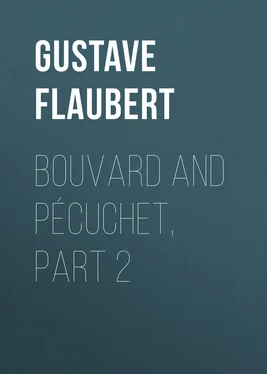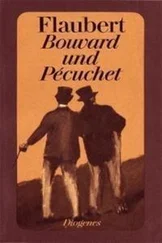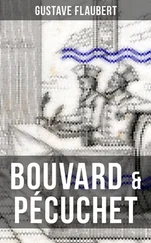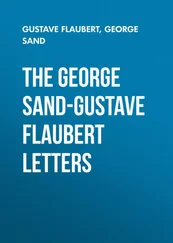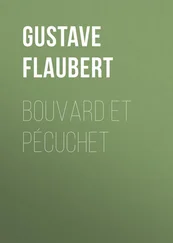Gustave Flaubert - Bouvard and Pécuchet, part 2
Здесь есть возможность читать онлайн «Gustave Flaubert - Bouvard and Pécuchet, part 2» — ознакомительный отрывок электронной книги совершенно бесплатно, а после прочтения отрывка купить полную версию. В некоторых случаях можно слушать аудио, скачать через торрент в формате fb2 и присутствует краткое содержание. Жанр: foreign_antique, foreign_prose, на английском языке. Описание произведения, (предисловие) а так же отзывы посетителей доступны на портале библиотеки ЛибКат.
- Название:Bouvard and Pécuchet, part 2
- Автор:
- Жанр:
- Год:неизвестен
- ISBN:нет данных
- Рейтинг книги:5 / 5. Голосов: 1
-
Избранное:Добавить в избранное
- Отзывы:
-
Ваша оценка:
- 100
- 1
- 2
- 3
- 4
- 5
Bouvard and Pécuchet, part 2: краткое содержание, описание и аннотация
Предлагаем к чтению аннотацию, описание, краткое содержание или предисловие (зависит от того, что написал сам автор книги «Bouvard and Pécuchet, part 2»). Если вы не нашли необходимую информацию о книге — напишите в комментариях, мы постараемся отыскать её.
Bouvard and Pécuchet, part 2 — читать онлайн ознакомительный отрывок
Ниже представлен текст книги, разбитый по страницам. Система сохранения места последней прочитанной страницы, позволяет с удобством читать онлайн бесплатно книгу «Bouvard and Pécuchet, part 2», без необходимости каждый раз заново искать на чём Вы остановились. Поставьте закладку, и сможете в любой момент перейти на страницу, на которой закончили чтение.
Интервал:
Закладка:
Pécuchet’s headpiece, placed in front of the fire, was not yet dry. While stretching it out he felt something in the lining, and out tumbled a medal of St. Joseph.
Madame de Noares wished to ascertain from Pécuchet whether he had not experienced some kind of change, bringing him happiness, and betrayed herself by her questions. On one occasion, whilst he was playing billiards, she had sewn the medal in his cap.
Evidently she was in love with him: they might marry; she was a widow, and he had had no suspicion of this attachment, which might have brought about his life’s happiness.
Though he exhibited a more religious tendency than M. Bouvard, she had dedicated him to St. Joseph, whose succour is favourable to conversions.
No one knew so well as she all the beads and the indulgences which they procure, the effect of relics, the privileges of blessed waters. Her watch was attached to a chain that had touched the bonds of St. Peter. Amongst her trinkets glittered a pearl of gold, in imitation of the one in the church of Allouagne containing a tear of Our Lord; a ring on her little finger enclosed some of the hair of the curé of Ars, and, as she was in the habit of collecting simples for the sick, her apartment was like a sacristy combined with an apothecary’s laboratory.
Her time was passed in writing letters, in visiting the poor, in dissolving irregular connections, and in distributing photographs of the Sacred Heart. A gentleman had promised to send her some “martyr’s paste,” a mixture of paschal wax and human dust taken from the Catacombs, and used in desperate cases in the shape of fly-blisters and pills. She promised some of it to Pécuchet.
He appeared shocked at such materialism.
In the evening a footman from the château brought him a basketful of little books relating pious phrases of the great Napoleon, witticisms of clergymen at inns, frightful deaths that had happened to atheists. All those things Madame de Noares knew by heart, along with an infinite number of miracles. She related several stupid ones – miracles without an object, as if God had performed them to excite the wonder of the world. Her own grandmother had locked up in a cupboard some prunes covered with a piece of linen, and when the cupboard was opened a year later they saw thirteen of them on the cloth forming a cross.
“Explain this to me.”
This was the phrase she used after her marvellous tales, which she declared to be true, with the obstinacy of a mule. Apart from this she was a harmless woman of lively disposition.
On one occasion, however, she deviated from her character.
Bouvard was disputing with her about the miracle of Pezilla: this was a fruit-dish in which wafers had been hidden during the Revolution and which had become gilded of itself.
“Perhaps there was at the bottom a little yellow colour caused by humidity?”
“Not at all! I repeat it, there was not! The cause of the gilding was the contact with the Eucharist.”
By way of proof she relied on the attestations of bishops.
“It is, they say, like a buckler, a – a palladium over the diocese of Perpignan. Ask Monsieur Jeufroy, then!”
Bouvard could not stand this kind of talk any longer; and, after he had looked over his Louis Hervieu, he took Pécuchet off with them.
The clergyman was finishing his dinner. Reine offered them chairs, and, at a gesture from her master, she went to fetch two little glasses, which she filled with Rosolio.
After this Bouvard explained what had brought him there.
The abbé did not reply candidly.
“Everything is possible to God, and the miracles are a proof of religion.”
“However, there are laws of nature – ”
“That makes no difference to Him. He sets them aside in order to instruct, to correct.”
“How do you know whether He sets them aside?” returned Bouvard. “So long as Nature follows her routine we never bestow a thought on it, but in an extraordinary phenomenon we believe we see the hand of God.”
“It may be there,” replied the ecclesiastic; “and when an occurrence has been certified by witnesses – ”
“The witnesses swallow everything, for there are spurious miracles.”
The priest grew red.
“Undoubtedly; sometimes.”
“How can we distinguish them from the genuine ones? If the genuine ones, given as proofs, have themselves need of proofs, why perform them?”
Reine interposed, and, preaching like her master, said it was necessary to obey.
“Life is a passage, but death is eternal.”
“In short,” suggested Bouvard, guzzling the Rosolio, “the miracles of former times are not better demonstrated than the miracles of to-day; analogous reasonings uphold those of Christians and Pagans.”
The curé flung down his fork on the table.
“Again I tell you those miracles were spurious! There are no miracles outside of the Church.”
“Stop!” said Pécuchet, “that is the same argument you used regarding the martyrs: the doctrine rests on the facts and the facts on the doctrine.”
M. Jeufroy, having swallowed a glass of water, replied:
“Even while denying them you believe in them. The world which twelve fishermen converted – look at that! it seems to me a fine miracle.”
“Not at all!”
Pécuchet gave a different account of the matter: “Monotheism comes from the Hebrews; the Trinity from the Indians; the Logos belongs to Plato, and the Virgin Mother to Asia.”
No matter! M. Jeufroy clung to the supernatural and did not desire that Christianity should have humanly the least reason for its existence, though he saw amongst all peoples foreshadowings or deformations of it. The scoffing impiety of the eighteenth century he would have tolerated, but modern criticism, with its politeness, exasperated him.
“I prefer the atheist who blasphemes to the sceptic who cavils.”
Then he looked at them with an air of bravado, as if to dismiss them.
Pécuchet returned home in a melancholy frame of mind. He had hoped for a reconciliation between faith and reason.
Bouvard made him read this passage from Louis Hervieu:
“In order to know the abyss which separates them, oppose their axioms.
“Reason says to you: ‘The whole comprehends the part,’ and faith replies to you: ‘By substantiation, Jesus, while communicating with the apostles, had His body in His hand and His head in His mouth.’
“Reason says to you: ‘No one is responsible for the crime of another,’ and faith replies to you: ‘By original sin.’
“Reason says to you: ‘Three make three,’ and faith declares that ‘Three make one.’ ”
They no longer associated with the abbé.
It was the period of the war with Italy. The respectable people were trembling for the Pope. They were thundering against Victor Emmanuel. Madame de Noares went so far as to wish for his death. Bouvard and Pécuchet alone protested timidly.
When the door of the drawing-room flew open in front of them and they looked at themselves in the lofty mirrors, as they passed, whilst through the windows they caught a glimpse of the walks where glared above the grass the red waistcoat of a man-servant, they felt a sensation of delight; and the luxuriousness of their surroundings rendered them indulgent to the words that were uttered there.
The count lent them all the works of M. de Maistre. He expounded the principles contained in them before a circle of intimate friends – Hurel, the curé, the justice of the peace, the notary, and the baron, his future son-in-law, who used to come from time to time for twenty-four hours to the château.
“What is abominable,” said the count, “is the spirit of ’eighty-nine. First of all they question the existence of God; then they dispute about government; then comes liberty – liberty for insults, for revolt, for enjoyments, or rather for plunder, so that religion and authority ought to proscribe the independents, the heretics. No doubt they will protest against what they call persecution, as if the executioners persecuted the criminals. Let me resume: No State without God! the law being unable to command respect unless it comes from on high, and, in fact, it is not a question of the Italians, but of determining which shall have the best of it, the Revolution or the Pope, Satan or Jesus Christ.”
Читать дальшеИнтервал:
Закладка:
Похожие книги на «Bouvard and Pécuchet, part 2»
Представляем Вашему вниманию похожие книги на «Bouvard and Pécuchet, part 2» списком для выбора. Мы отобрали схожую по названию и смыслу литературу в надежде предоставить читателям больше вариантов отыскать новые, интересные, ещё непрочитанные произведения.
Обсуждение, отзывы о книге «Bouvard and Pécuchet, part 2» и просто собственные мнения читателей. Оставьте ваши комментарии, напишите, что Вы думаете о произведении, его смысле или главных героях. Укажите что конкретно понравилось, а что нет, и почему Вы так считаете.
